Items
Search full-text
LGBTIQA+ Arts and Artists
Class
CreativeWork
-
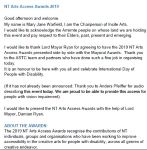 "Incite Arts - NT Arts Access Awards and Certificates of Commendation 2019" InCite Arts and Arts Access Darwin announcement of NT Arts Access Awards and Certificates of Commendation 2019
"Incite Arts - NT Arts Access Awards and Certificates of Commendation 2019" InCite Arts and Arts Access Darwin announcement of NT Arts Access Awards and Certificates of Commendation 2019 -
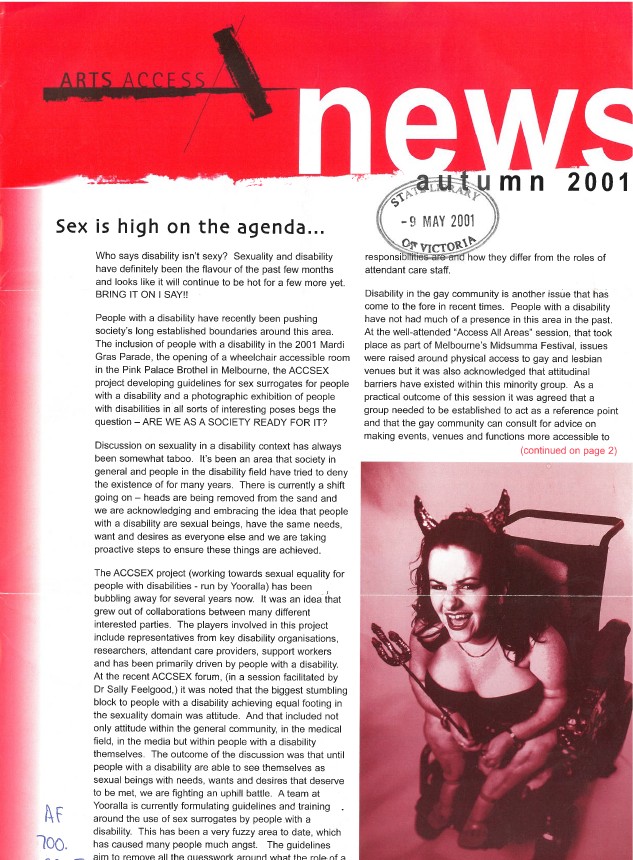 “Arts Access Victoria - Access Newsletter Autumn 2001”
“Arts Access Victoria - Access Newsletter Autumn 2001” -
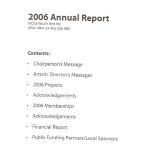 "InCite Arts Annual Report 2006" InCite Arts Annual Report 2006 - includes Chairperson and Artistic Director's Messages, Projects, Guest Hip Hop Artists Monkey Marc & Elf Tranzporter, Memberships, Partners
"InCite Arts Annual Report 2006" InCite Arts Annual Report 2006 - includes Chairperson and Artistic Director's Messages, Projects, Guest Hip Hop Artists Monkey Marc & Elf Tranzporter, Memberships, Partners -
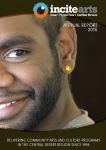 "Incite Arts Annual Report 2015" Incite Arts Annual Report 2015 - Chairperson, Artistic Director and Community Cultural Development Manager Messages, Partnerships, Projects (Alice Springs Skate Park Aerosol Art Project, ‘Your Voice Strong Voice’ Music Video & Mural Art, ‘Unbroken Land’, ‘Let Me See: Arts & Technology’, SPRUNG Youth Dance, Partnership with Warlpiri Youth Development Aboriginal Corporation. ‘Red Sand Culture’ Music & Dance Mentoring, ‘Southern Ngalia’ Cultural Dance, ‘stArts with D’ Performance, ‘SELFIES ’ Writer in Residence, Restless Dance Theatre Residence, Partnerships with Schools)
"Incite Arts Annual Report 2015" Incite Arts Annual Report 2015 - Chairperson, Artistic Director and Community Cultural Development Manager Messages, Partnerships, Projects (Alice Springs Skate Park Aerosol Art Project, ‘Your Voice Strong Voice’ Music Video & Mural Art, ‘Unbroken Land’, ‘Let Me See: Arts & Technology’, SPRUNG Youth Dance, Partnership with Warlpiri Youth Development Aboriginal Corporation. ‘Red Sand Culture’ Music & Dance Mentoring, ‘Southern Ngalia’ Cultural Dance, ‘stArts with D’ Performance, ‘SELFIES ’ Writer in Residence, Restless Dance Theatre Residence, Partnerships with Schools) -
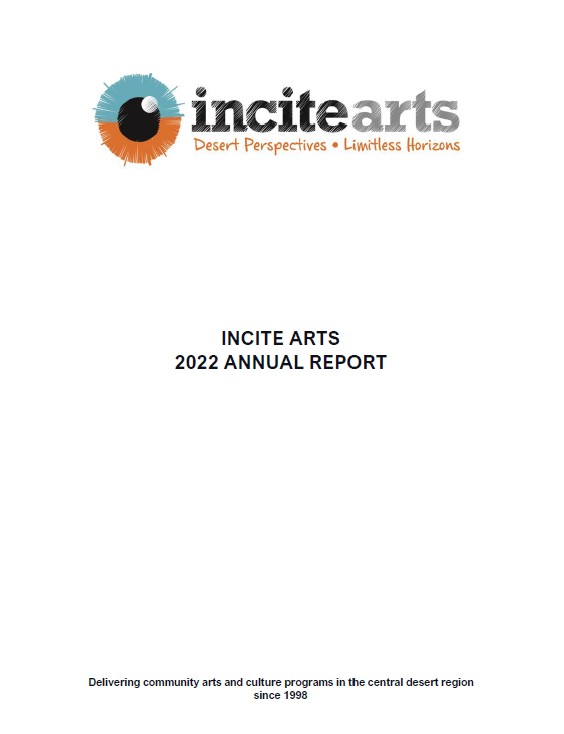 "Incite Arts Annual Report 2022" Incite Arts Annual Report 2022 - About Incite Arts, Board’s Report, Highlights, Project (stArts with D’ Performance Ensemble ‘Strong Feelings’ Program, Southern Ngalia Warlpiri Women and Girls Dance Camp Program, Create Communities, Unbroken Land, NT Arts Access Awards), Partners
"Incite Arts Annual Report 2022" Incite Arts Annual Report 2022 - About Incite Arts, Board’s Report, Highlights, Project (stArts with D’ Performance Ensemble ‘Strong Feelings’ Program, Southern Ngalia Warlpiri Women and Girls Dance Camp Program, Create Communities, Unbroken Land, NT Arts Access Awards), Partners -
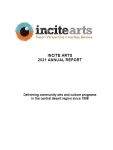 "Incite Arts Annual Report 2021" Incite Arts Annual Report 2021 - About Incite Arts, Board’s Report, Highlights, Project (stArts with D’ Performance Ensemble ‘Strong Feelings’ Program, Warlpiri Women and Girls Dance Camp Program aka Southern Ngalia, Create Communities, Unbroken Land, NT Arts Access Awards), Partners
"Incite Arts Annual Report 2021" Incite Arts Annual Report 2021 - About Incite Arts, Board’s Report, Highlights, Project (stArts with D’ Performance Ensemble ‘Strong Feelings’ Program, Warlpiri Women and Girls Dance Camp Program aka Southern Ngalia, Create Communities, Unbroken Land, NT Arts Access Awards), Partners -
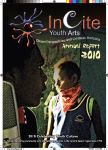 "InCite Arts Annual Report 2010" InCite Arts Annual Report 2010 - includes Chairperson, Artistic Director and Community Cultural Development Manager Messages, Arts Access Central Australia, Projects
"InCite Arts Annual Report 2010" InCite Arts Annual Report 2010 - includes Chairperson, Artistic Director and Community Cultural Development Manager Messages, Arts Access Central Australia, Projects -
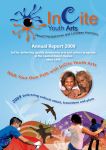 "InCite Arts Annual Report 2009" InCite Arts Annual Report 2009 - includes Chairperson, Artistic Director and Community Cultural Development Manager Messages, Arts Access Central Australia, Projects, Mentorships
"InCite Arts Annual Report 2009" InCite Arts Annual Report 2009 - includes Chairperson, Artistic Director and Community Cultural Development Manager Messages, Arts Access Central Australia, Projects, Mentorships -
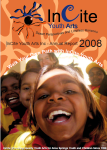 "InCite Arts Annual Report 2008" InCite Arts Annual Report 2008 - includes Chairperson, Artistic Director and Community Cultural Development Manager Messages, Projects, examples of work, Partners
"InCite Arts Annual Report 2008" InCite Arts Annual Report 2008 - includes Chairperson, Artistic Director and Community Cultural Development Manager Messages, Projects, examples of work, Partners -
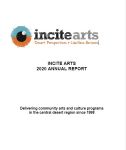 "Incite Arts Annual Report 2020" Incite Arts Annual Report 2020 - About Incite Arts, Board’s Report, Highlights, Project (Move Masters new creative development for stArts with D’ Performance Ensemble, Olive Pink Opera Collaboration, Create Communities, Unbroken Land, Acacia Hill School Workshop Program, NT Arts Access Awars), Partners
"Incite Arts Annual Report 2020" Incite Arts Annual Report 2020 - About Incite Arts, Board’s Report, Highlights, Project (Move Masters new creative development for stArts with D’ Performance Ensemble, Olive Pink Opera Collaboration, Create Communities, Unbroken Land, Acacia Hill School Workshop Program, NT Arts Access Awars), Partners -
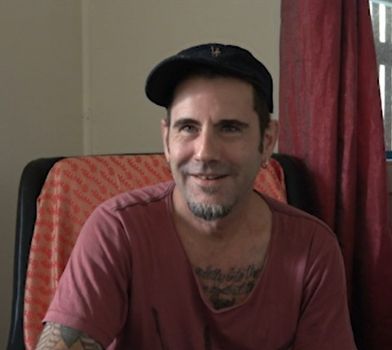 "Interview with Jeremy Hawkes" Jeremy Hawkes is a multidisciplinary artist working in sculpture, drawing, painting and photography as well as being a writer, educator and disability arts leader. Interview Summary Jeremy Hawkes, a visual artist, opened up about his life and identity during his interview. After a debilitating workplace accident, he had to reimagine his sculptural practice due to his acquired disability and ventured into drawing, which helped him cope with multiple operations and diagnoses. Jeremy's art explores themes of identity and the interconnectedness between the macro and the micro, drawing inspiration from neurobiology and medical imagery. Despite his struggles, Jeremy commits to his studio daily, aims for success without fear, and advocates for greater visibility and opportunities for artists with disabilities.
"Interview with Jeremy Hawkes" Jeremy Hawkes is a multidisciplinary artist working in sculpture, drawing, painting and photography as well as being a writer, educator and disability arts leader. Interview Summary Jeremy Hawkes, a visual artist, opened up about his life and identity during his interview. After a debilitating workplace accident, he had to reimagine his sculptural practice due to his acquired disability and ventured into drawing, which helped him cope with multiple operations and diagnoses. Jeremy's art explores themes of identity and the interconnectedness between the macro and the micro, drawing inspiration from neurobiology and medical imagery. Despite his struggles, Jeremy commits to his studio daily, aims for success without fear, and advocates for greater visibility and opportunities for artists with disabilities. -
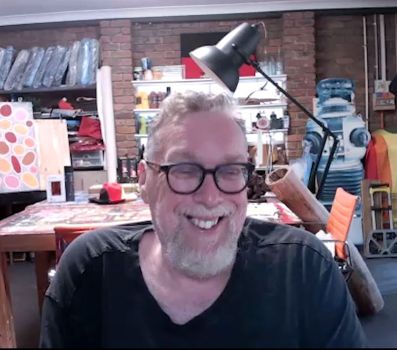 "Interview with Paul Constable Calcott" Uncle Paul Constable Calcott is a proud Wiradjuri man and artist living with a disability on Gubbi Gubbi country….. Uncle Paul uses his art to share stories of his journey as an aboriginal gay man living with a disability in urban Australia. Interview Summary Uncle Paul Calcott is a proud Wiradjuri elder and disability advocate who contracted polio as a child. During the interview, Uncle Paul discusses becoming an artist later in life through the encouragement of his husband and influenced by the storytelling of his culture. He embraces his identity as an Aboriginal, gay man living with disability. He talks about his artwork aiming to celebrate the achievements and contributions of people with disabilities, using traditional symbols to tell new stories, particularly about disability within Indigenous communities. Although there has been increased visibility and acknowledgment of disability arts in Australia, Paul notes that there's still a long way to go in terms of policy, funding, and public recognition. Uncle Paul says art can reflect political and social issues, and he proudly identifies as an artist with a disability and believes in the significance of diverse stories being told through the arts.
"Interview with Paul Constable Calcott" Uncle Paul Constable Calcott is a proud Wiradjuri man and artist living with a disability on Gubbi Gubbi country….. Uncle Paul uses his art to share stories of his journey as an aboriginal gay man living with a disability in urban Australia. Interview Summary Uncle Paul Calcott is a proud Wiradjuri elder and disability advocate who contracted polio as a child. During the interview, Uncle Paul discusses becoming an artist later in life through the encouragement of his husband and influenced by the storytelling of his culture. He embraces his identity as an Aboriginal, gay man living with disability. He talks about his artwork aiming to celebrate the achievements and contributions of people with disabilities, using traditional symbols to tell new stories, particularly about disability within Indigenous communities. Although there has been increased visibility and acknowledgment of disability arts in Australia, Paul notes that there's still a long way to go in terms of policy, funding, and public recognition. Uncle Paul says art can reflect political and social issues, and he proudly identifies as an artist with a disability and believes in the significance of diverse stories being told through the arts. -
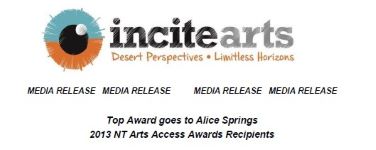 "Incite Arts - NT Arts Access Awards Media Release 2013" Media release reads, in part, "Through honoring the valuable partnerships that exist between the disability and arts sectors, award winners were selected based on their initiative, leadership, and involvement in projects that embody the spirit of genuine partnership and the benefits for people with disability and the communities we live in."
"Incite Arts - NT Arts Access Awards Media Release 2013" Media release reads, in part, "Through honoring the valuable partnerships that exist between the disability and arts sectors, award winners were selected based on their initiative, leadership, and involvement in projects that embody the spirit of genuine partnership and the benefits for people with disability and the communities we live in." -
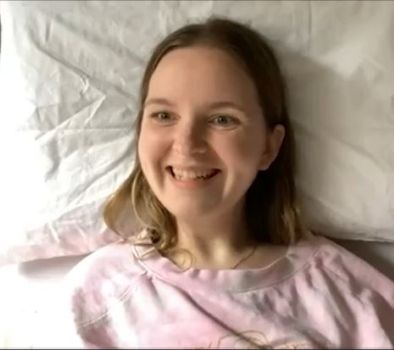 "Interview with Jess Cochran" Jess Cochran (they/them) is an actor, model, writer and disability advocate. Interview Summary: Jess Cochran is a queer, non-binary, neurodivergent, performing artist, advocate, writer, and consumer consultant with a background in both physical and psychosocial disabilities. Their journey into the performing arts began accidentally with a role in the Awards winning Melbourne Fringe Festival production, Qualia, which opened doors to more local and international Awards-winning work in film and stage. Jess identifies proudly with their disabilities and considers their art both a personal expression and a political act aimed at highlighting the issues faced by the disability community. Jess’s work spans across writing, modelling, and various performance arts, and they wish to see an increase of disability arts representation in mainstream media with authentic casting, opportunities and improved accessibility for disabled performers. Jess is also passionate about highlighting intersectionality in disability arts.
"Interview with Jess Cochran" Jess Cochran (they/them) is an actor, model, writer and disability advocate. Interview Summary: Jess Cochran is a queer, non-binary, neurodivergent, performing artist, advocate, writer, and consumer consultant with a background in both physical and psychosocial disabilities. Their journey into the performing arts began accidentally with a role in the Awards winning Melbourne Fringe Festival production, Qualia, which opened doors to more local and international Awards-winning work in film and stage. Jess identifies proudly with their disabilities and considers their art both a personal expression and a political act aimed at highlighting the issues faced by the disability community. Jess’s work spans across writing, modelling, and various performance arts, and they wish to see an increase of disability arts representation in mainstream media with authentic casting, opportunities and improved accessibility for disabled performers. Jess is also passionate about highlighting intersectionality in disability arts. -
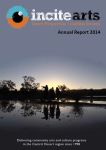 "Incite Arts Annual Report 2014" Incite Arts Annual Report 2014 - Chairperson, Artistic Director and Community Cultural Development Manager Messages, Projects (SPRUNG Youth Dance, Partnership with Warlpiri Youth Development Aboriginal, ‘Red Sand Culture’ Music & Dance Mentoring, ‘Southern Ngalia’ Cultural Dance, ‘stArts with D’ Performance Ensemble, School Partnerships - Artists in Residence program: Acacia Hill School & Centralian Middle School)
"Incite Arts Annual Report 2014" Incite Arts Annual Report 2014 - Chairperson, Artistic Director and Community Cultural Development Manager Messages, Projects (SPRUNG Youth Dance, Partnership with Warlpiri Youth Development Aboriginal, ‘Red Sand Culture’ Music & Dance Mentoring, ‘Southern Ngalia’ Cultural Dance, ‘stArts with D’ Performance Ensemble, School Partnerships - Artists in Residence program: Acacia Hill School & Centralian Middle School) -
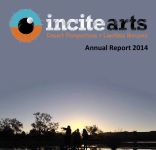 "Incite Arts Annual Report 2014 - Online" InCite Arts Annual Report 2014 - Chairperson, Artistic Director and Community Cultural Development Manager Messages, Projects (SPRUNG Youth Dance, Partnership with Warlpiri Youth Development Aboriginal, ‘Red Sand Culture’ Music & Dance Mentoring, ‘Southern Ngalia’ Cultural Dance, ‘stArts with D’ Performance Ensemble, School Partnerships - Artists in Residence program: Acacia Hill School & Centralian Middle School)
"Incite Arts Annual Report 2014 - Online" InCite Arts Annual Report 2014 - Chairperson, Artistic Director and Community Cultural Development Manager Messages, Projects (SPRUNG Youth Dance, Partnership with Warlpiri Youth Development Aboriginal, ‘Red Sand Culture’ Music & Dance Mentoring, ‘Southern Ngalia’ Cultural Dance, ‘stArts with D’ Performance Ensemble, School Partnerships - Artists in Residence program: Acacia Hill School & Centralian Middle School) -
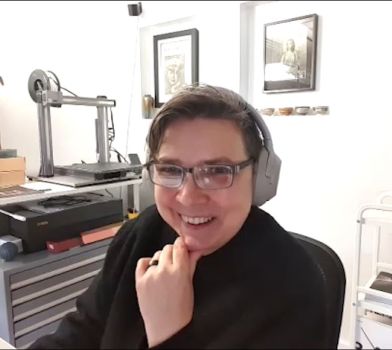 "Interview with Alison Bennett" Dr Alison Bennett is a senior lecturer in photography at RMIT School of Art specialising in expanded photography, webXR, queer and feminist creative practices. Interview Summary Alison Bennett, an artist and academic, spoke about her work in expanded photography, their experiences with autism, and the intersection of disability discourse with queer activism in their life and work. Their current project, vegetal/digital, arose from their experiences during the pandemic and connects audiences with plant sentience through interactive digital art. Alison also discussed the political nature of their work, aiming to shift ontological frameworks and exploring new modes of engagement through art. They reflected on the significant cultural changes regarding neurodiversity in the last few decades, highlighting the growing self-advocacy among autistic artists and their increasing impact in the arts.
"Interview with Alison Bennett" Dr Alison Bennett is a senior lecturer in photography at RMIT School of Art specialising in expanded photography, webXR, queer and feminist creative practices. Interview Summary Alison Bennett, an artist and academic, spoke about her work in expanded photography, their experiences with autism, and the intersection of disability discourse with queer activism in their life and work. Their current project, vegetal/digital, arose from their experiences during the pandemic and connects audiences with plant sentience through interactive digital art. Alison also discussed the political nature of their work, aiming to shift ontological frameworks and exploring new modes of engagement through art. They reflected on the significant cultural changes regarding neurodiversity in the last few decades, highlighting the growing self-advocacy among autistic artists and their increasing impact in the arts. -
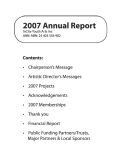 "InCite Arts Annual Report 2007" InCite Arts Annual Report 2007 - includes Chairperson and Artistic Director's Messages, Projects, Memberships, Partners
"InCite Arts Annual Report 2007" InCite Arts Annual Report 2007 - includes Chairperson and Artistic Director's Messages, Projects, Memberships, Partners -
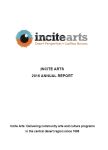 "Incite Arts Annual Report 2016" Incite Arts Annual Report 2016 – About Incite Arts, Chairperson’s Report, Highlights, Project (Alice Springs Skate Park Aerosol Art Project, ‘Southern Ngalia’ Women’s Cultural Program, ‘stArts with D’ Performance Ensemble, Restless Dance Theatre Residence, ‘Careful I Live Here’ Video Works, ‘Unbroken Land’, SPRUNG Youth Dance)
"Incite Arts Annual Report 2016" Incite Arts Annual Report 2016 – About Incite Arts, Chairperson’s Report, Highlights, Project (Alice Springs Skate Park Aerosol Art Project, ‘Southern Ngalia’ Women’s Cultural Program, ‘stArts with D’ Performance Ensemble, Restless Dance Theatre Residence, ‘Careful I Live Here’ Video Works, ‘Unbroken Land’, SPRUNG Youth Dance) -
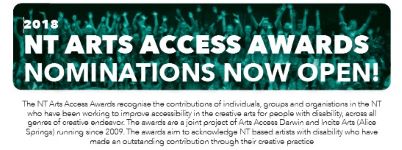 "Incite Arts - NT Arts Access Awards - Nominations 2018" InCite Arts - NT Arts Access Awards - Nomination 2018
"Incite Arts - NT Arts Access Awards - Nominations 2018" InCite Arts - NT Arts Access Awards - Nomination 2018 -
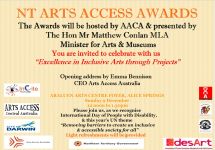 "InCite Arts - NT Arts Access Awards - Invitation 2012" InCite Arts - NT Arts Access Awards - Invitation 2012
"InCite Arts - NT Arts Access Awards - Invitation 2012" InCite Arts - NT Arts Access Awards - Invitation 2012 -
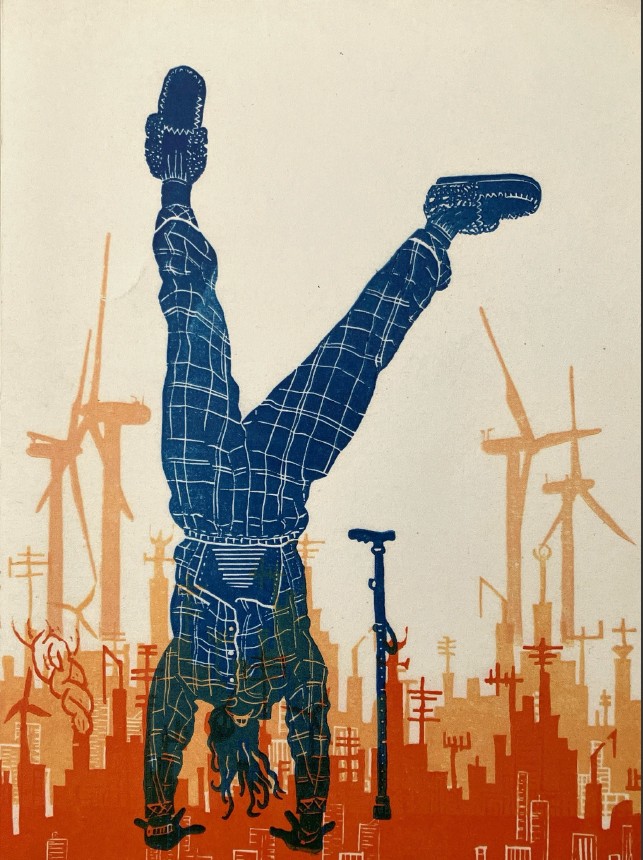 “Arts Access Victoria – Queer Voices at Nebula 2022 - Promotional Flyer"
“Arts Access Victoria – Queer Voices at Nebula 2022 - Promotional Flyer" -
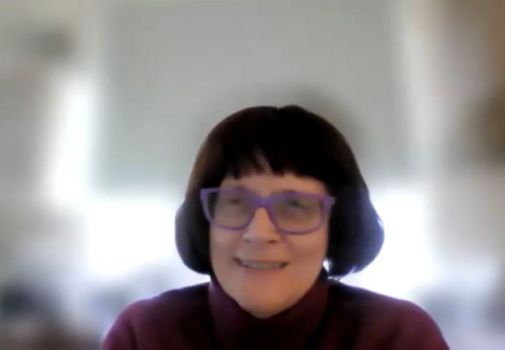 "Interview with Janice Florence" Janice Florence is a performing artist and disability advocate. She originally trained as a Teacher and Librarian. Janice has worked in Education and Libraries for many years and in disability advocacy for 20 years She has worked in Training and Consultation at Arts Access Vic for 12 years. Janice has been involved in theatre, dance and human movement for over 35 years. For 25 years she has been the Artistic Director of Weave Movement Theatre, comprising disabled and non-disabled performers. Weave has produced many devised original works often with respected performing artists as collaborators. She was the inaugural recipient of the Australia Council Awards for Disability Arts-Established Artist in 2019. Interview Summary Janice Florence is a veteran performer and Artistic Director of Weave Movement Theatre, which includes disabled performers. During the interview, Janice reflected on her extensive history with dance, both prior to and after acquiring her disability, highlighting the significance of political and personal themes, as well as the use of humour in her work. She discussed the ongoing challenges in securing accessible rehearsal and performance spaces, along with the complexities of funding and recognition within the Disability Arts scene in Australia. Janice also acknowledged the importance of Disability Arts historically and its potential for challenging societal expectations regarding disability.
"Interview with Janice Florence" Janice Florence is a performing artist and disability advocate. She originally trained as a Teacher and Librarian. Janice has worked in Education and Libraries for many years and in disability advocacy for 20 years She has worked in Training and Consultation at Arts Access Vic for 12 years. Janice has been involved in theatre, dance and human movement for over 35 years. For 25 years she has been the Artistic Director of Weave Movement Theatre, comprising disabled and non-disabled performers. Weave has produced many devised original works often with respected performing artists as collaborators. She was the inaugural recipient of the Australia Council Awards for Disability Arts-Established Artist in 2019. Interview Summary Janice Florence is a veteran performer and Artistic Director of Weave Movement Theatre, which includes disabled performers. During the interview, Janice reflected on her extensive history with dance, both prior to and after acquiring her disability, highlighting the significance of political and personal themes, as well as the use of humour in her work. She discussed the ongoing challenges in securing accessible rehearsal and performance spaces, along with the complexities of funding and recognition within the Disability Arts scene in Australia. Janice also acknowledged the importance of Disability Arts historically and its potential for challenging societal expectations regarding disability. -
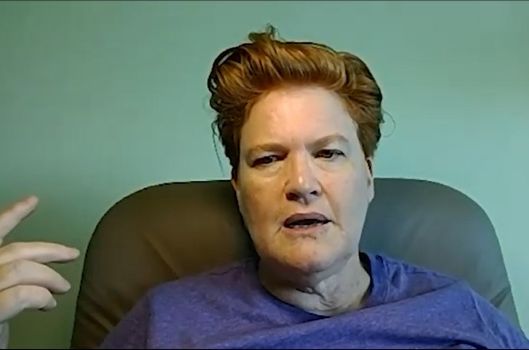 "Interview with Michèle Saint-Yves" Michèle Saint-Yves is a playwright, filmmaker, poet, and director. Interview Summary Michèle Saint-Yves’ background includes a colonial upbringing in Pacific territories, a Scottish boarding school education, and a complex personal journey of confronting her own inherent racism and colonial legacy, particularly through her writing. Her work as an artist with disability is deeply informed by her sense of otherness and focuses on creating inclusive performance-based work that challenges mainstream audiences and systems, aiming for transformative experiences that impact disability justice and community. Michèle actively embraced the social model of disability, which shifted her understanding of herself and her art, and has received recognition for her pioneering work with the prize-winning show "Clock for No Time." However, recognising the social model’s limitations, her current creative endeavours are concerned with 'access intimacy' and evaluating the lasting impact of her performances, in collaboration with other artists and through research grants.
"Interview with Michèle Saint-Yves" Michèle Saint-Yves is a playwright, filmmaker, poet, and director. Interview Summary Michèle Saint-Yves’ background includes a colonial upbringing in Pacific territories, a Scottish boarding school education, and a complex personal journey of confronting her own inherent racism and colonial legacy, particularly through her writing. Her work as an artist with disability is deeply informed by her sense of otherness and focuses on creating inclusive performance-based work that challenges mainstream audiences and systems, aiming for transformative experiences that impact disability justice and community. Michèle actively embraced the social model of disability, which shifted her understanding of herself and her art, and has received recognition for her pioneering work with the prize-winning show "Clock for No Time." However, recognising the social model’s limitations, her current creative endeavours are concerned with 'access intimacy' and evaluating the lasting impact of her performances, in collaboration with other artists and through research grants. -
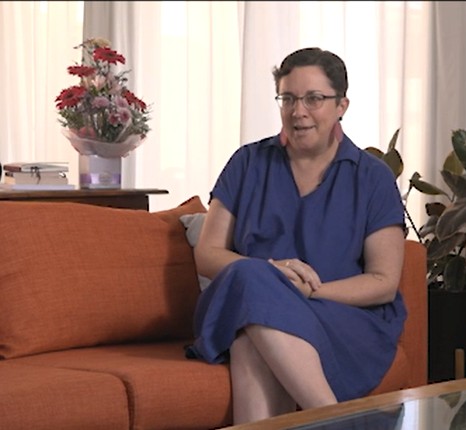 "Interview with Kate Larsen" Kate Larsen (she/her) is a writer, consultant, leader and advocate with Australian and international experience in the arts and disability sector. Interview Summary Kate Larsen (she/her) is a recognised arts and disability advocate who emphasises the importance and inherent politics of self-expression and access in the arts. A non-disabled ally, Kate was influenced to pursue a career in the sector by the profound impact of learning about the social model of disability, which sparked a commitment to creating opportunities for and by disabled individuals. Larsen's work has involved fostering leadership among disabled artists and arts workers, advocating for disability-led organisations, and driving systemic change within Australia’s arts and cultural sector. She hopes to see continued progress towards equity and representation in the arts, with the NDIS playing a crucial role, and an increased presence of disabled artists, arts workers and leaders in mainstream organisations.
"Interview with Kate Larsen" Kate Larsen (she/her) is a writer, consultant, leader and advocate with Australian and international experience in the arts and disability sector. Interview Summary Kate Larsen (she/her) is a recognised arts and disability advocate who emphasises the importance and inherent politics of self-expression and access in the arts. A non-disabled ally, Kate was influenced to pursue a career in the sector by the profound impact of learning about the social model of disability, which sparked a commitment to creating opportunities for and by disabled individuals. Larsen's work has involved fostering leadership among disabled artists and arts workers, advocating for disability-led organisations, and driving systemic change within Australia’s arts and cultural sector. She hopes to see continued progress towards equity and representation in the arts, with the NDIS playing a crucial role, and an increased presence of disabled artists, arts workers and leaders in mainstream organisations.
